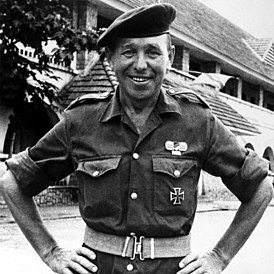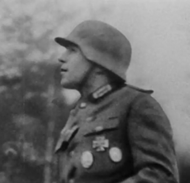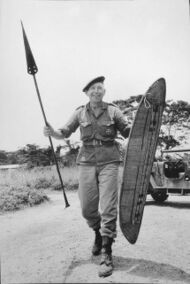Fritz Koehne (Pacifica)
Fritz Sebastian Koehne | |
|---|---|
 | |
| Nickname(s) | "Smiling Death" "Kybok Koehne" |
| Born | 17 August 1922 Crossen an der Salzach, Weissersteiner Empire |
| Died | 22 December 1999 (aged 77) Karlsdorf, Weissersteiner Empire |
| Allegiance | |
| Rank | Major |
| Unit | Reichsheer FARK |
| Commands held | Kybok Dragoons Pelinese Volunteer Legion |
| Battles/wars | Weissersteiner Civil War Clashonian Civil War Sallodesian Bush War Pelinese Civil War Cimbrian Civil War Second Elbonian Crisis |
| Spouse(s) | Lara Koehne (née Steinhauser) |
| Children | Caspar Koehne Robert Koehne Mekongo Siba (adopted) |
"Many see my adopted father as a warmonger, a dishonourable merc or scum. However, I can attest that behind the facade of war, Koehne was a deeply caring man with an enormous heart. A man just like any other."—Gen. Mekongo Siba during a Sallodesian interview about his adopted father.
Fritz Sebastian Koehne (17 August 1922 – 22 December 1999), better known by his nicknames Kybok Koehne or Smiling Death, was a Weissersteiner soldier, military advisor, paramilitary trainer, and foreign fighter who fought in multiple wars abroad. He was influential in establishing several paramilitary groups abroad (namely the Kybok Dragoons and the Pelinese Volunteer Legion). This inadvertently made him an important and influential military figure in Weisserstein during the Cold War. He also adopted Sallodesian General Mekongo Siba during his time with the Kybok Dragoons in the Sallodesian Bush War.
Early life
Koehne was born in Crossen an der Salzach, Weisserstein, in 1922. His father served in the Weissersteiner Reichswehr's 7th Army during the War of 1919. This would affect Koehne in his interest with military-related topics. At the age of eight, his family moved to the city of Lindenburg. He enrolled to a boarding school there and then commenced training for accountancy. He also joined the Landwehr, the reserve component of the Weissersteiner Reichswehr. In 1928, his sister, Marja, was born. It was also around this time he met Friedrich Josef von Lettow-Ermhau, who would later become one of the main patrons of the formation of the United Crabryan Duchy, and Alois Auernheimer, a writer who would later wrote Koehne's biography Kybok Koehne - The Biography of Fritz Sebastian Koehne.
Weissersteiner Civil War
Koehne's service into the Landwehr would eventually led to him seeing action during the Weissersteiner Civil War, and he joined the Reichswehr at the age of 18. He fought during the Siege of Lindenburg against both Straßrist and communist forces. During the engagement, Marja would be killed during an assault by communist soldiers in the city's eastern districts, his mother died from an artillery blast, and his father was seen executed by a Straßrist firing squad. This was said to have caused Koehne to fall into a deep state of depression, which, according to his friends, eventually morphed into hatred for fascists, communists, and other enemies of the state.

In 1944, the siege was lifted following the Reichswehr's liberation of the city. For his efforts in the fighting, Koehne received an Iron Cross, second class, which would become an iconic trademark of his throughout the Cold War. Koehne would later also partook in other battles throughout the war, such as the battles of Crossen an der Salzach, Zeltbirge, Illmundigen, Gladenborn, and Kroßrau. For his service during the war, he was promoted to Oberleutnant in January 1945.
Post-Civil War
Following the end of the Weissersteiner Civil War, Koehne completed his training as a chartered accountant, qualifying in 1947. He remained as part of the reserve component in the Reichswehr. During the Great War, Weisserstein secretly drafted a mobilization plan known as "Fall Leopold" due to fears of the war spilling into Weisserstein. Among the men drafted for the mobilization was Koehne, though Fall Leopold was never executed. Alois Auernheimer, a writer and close friend of Koehne, noted that Koehne was "personally invested" in the Great War, and that his views had been "extremely radicalized" from the Civil War.
Involvement in the Clashonian Civil War
Koehne would secretly join as part of the Volunteer Army of the Just King during the Clashonian Civil War. Auernheimer stated in Koehne's biography that this was due to the Weissersteiner and Clashonian monarchies being "in the same boat", surrounded by radicals and anti-monarchists. His time in the service of FARK ended following the victory of General Šummaker's Second Clashonian Republic. According to Auernheimer, Koehne maintained close relations with members of the Clashonian monarchist movement, and especially members of FARK.
Cold War activities
Sallodesian Bush War
- Tasked with helping Sallodesia against commies, organized the Imperial Kybok Dragoons with fellow Reichswehr officer X -

Pelinese Civil War
- Formed the PVL without informing the Imperial Crown. Entered into a fight with Reichswehr command and was discharged in 1979. Reinstated into the Reichswehr in 1980 -
Cimbrian Civil War
- Helped organized effort of monarchists and Christians in Cimbria, this time working under the supervision of General Y -
Elbonian Crisis
- Gave strategic support to Landweer forces during the crisis -
Retirement and death
In 1995, at the age of 73, Koehne retired from the Reichswehr, claiming that he finally felt "satisfied" in where he was at life. Koehne would spend his final years touring Weisserstein, Sugovia, Clashonia, and other nations throughout Pacifica, whilst maintaining contact with his close confidants in both the Reichswehr and elsewhere. He visited Sallodesia and Pelinai after his involvements in their conflicts in 1996 and 1997 respectively. The latter would be his final overseas visit before he was hospitalized in September.
In September 1997, Koehne was rushed to the Prince Leonhard hospital in Karlsdorf following a heart attack. He stayed there until December 1999, when he passed away. He was buried in the Lindenburg Soldier's Memorial in January, surrounded by many of his comrades who died during the Siege of Lindenburg.
Family life
Koehne married Lara Koehne (née Steinhauser) in 1956 and had two children, Caspar (1958) and Robert (1960). During his time in Sallodesia, he also adopted orphan Mekongo Siba, who's parents died during the Bush War. Koehne's reasoning for the adoption was that Siba was "almost like me, who lost everything to demagogues" and sought to fill in a father figure role for Siba.
Caspar would join the Weissersteiner Reichswehr and served as a captain during the 1994 Clashonian War. Robert, despite his upbringing, took up writing as a hobby before eventually becoming a professional writer with the release of his first book Das Seeboot in 1984. Robert would author two books about his father, the first was his father's journal during his services in Sallodesia, Pelinai, Cimbria, and more, with additional commentary and context from Robert. It was released under the title War Journal of an International Soldier. His second work was released under the title of My Father was a Mercenary(?), which debunked many accusations that was given to Koehne throughout his Cold War career and was a follow-up commentary to his previous book. Both books received critical acclaim, though many also criticized the book for its biased depictions of Koehne. Siba, his adoptive son, would join him in his endeavors in Pelinai and Cimbria, and eventually became a general of the Sallodesian military.
Koehne continued to work as an accountant between 1947 and 1960, with a small gap between 1950 and 1953. His favorite hobby was hunting, especially after his time in Sallodesia.